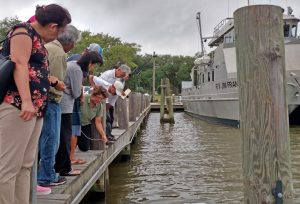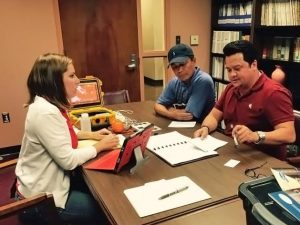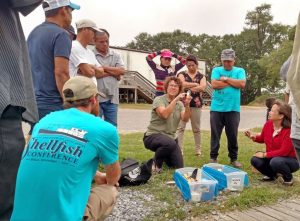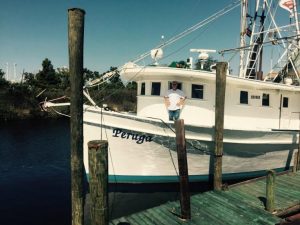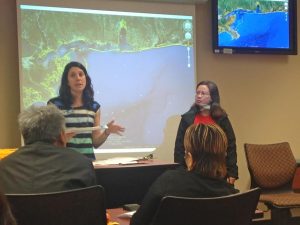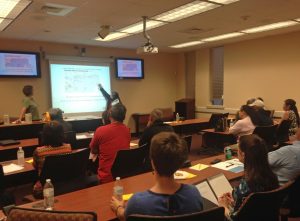Marine Researchers Engage Fishing Communities to Improve Trust in Science
– JUNE 1, 2017
Trust in scientific findings is especially important when the research relates to your livelihood and health as it did for commercial and recreational fishing communities after the Deepwater Horizon oil spill. Many scientists conducting early studies on the spill believed that they were considered trustworthy, like firemen and policemen. However, it became apparent as the spill unfolded that the relationship of the public, science, and trust was complex and sometimes on shaky ground.
“In the weeks and months following the oil spill, the issue of trust came up,” said CONCORDE Outreach Coordinator Jessie Kastler. “People who make a living off the sea simply didn’t trust information they were receiving about what was happening to the Gulf and didn’t know who they could trust.”
Scientists and outreach personnel with the CONCORDE group are working to improve their relationship with the public by involving Gulf Coast commercial and recreational fishers in their research as Kastler explained, “We want to tackle that issue by reaching out to the community and being completely transparent about our methods and data.”
The researchers are studying nearshore currents and circulation flows and their potential role in creating sub-surface pathways that influence the movement of sediment, plankton, and other matter such as oil spill material which can affect the habitats and food for fish, shrimp, oysters, and crabs.
The team reached out to local fishers by hosting informational meetings in Mississippi and Louisiana and training sessions at the University of Southern Mississippi Gulf Coast Research Laboratory in 2016 and 2017. Approximately 50 men and women, including Vietnamese (refugees from the Vietnam conflict) and Cajun fishers (descendants from locations such as the Acadia Province, Yugoslavia, and the Canary Islands), attended two or more events.
Prior to these meetings and training sessions, two Vietnamese and Cajun boat captains served as liaisons to their fishing communities and generated interest in the outreach efforts. Thao Vu with the Mississippi Coalition of Vietnamese American Fisher Folks and Families helped the researchers reach out to Vietnamese fishers and provided language interpretation. Vu also helped participants compile questions about coastal science topics important to them including loss of oyster reefs, marine oil snow, water movement, plankton distributions, harmful algal blooms, effects of freshwater flow, fishing regulations, and oil spill impacts.
The participants learned about ongoing research from senior and early-career scientists who shared their specific areas of research, gave overviews of what is currently known, and explained how the research is applicable to fishers’ livelihoods and health. Participants interested in becoming directly involved with ongoing research received hands-on training in methods and instruments, including the YSI’s CastAway and ProDSSII conductivity-temperature-depth (CTD) water samplers, and learned how to consistently record observations.
Participants then used the training they received to collect data while they fished and trawled for shrimp and reported it to the scientists. The researchers, in turn, included the fishers’ data in computer models that they are developing for improved predictions of sub-surface water flows. Fisher folk will continue collecting and returning data through the end of the CONCORDE project.
The scientists are benefiting, too, from the engagement efforts. “We want to learn from them,” Kastler said. “They’ve been out on the water for decades and know through experience what is typical for the area.” Lessons learned will help the team be more effective in public interactions the next time an event like an oil spill or harmful algal blooms happen.
“We want the public to approach science with a sense of trust,” said CONCORDE Director Monty Graham as he explained what they hope to accomplish. “It’s unraveling what people think about science and how it can be applied. By getting instruments in their hands and engaging them in our activities, hopefully they will find that science is not mysterious and they can contribute to it.”
The Mississippi Coalition of Vietnamese American Fisher Folks and Families and the University of Southern Mississippi are the recipients of a 2017 National Academies of Science Gulf Research Program Capacity Building Grant. Their project will continue efforts to connect scientists with multi-ethnic fishing communities in Mississippi, Louisiana and Alabama to encourage a two-way information exchange.
To learn more about CONCORDE research, check out these articles:
- Understanding Oil Transport in Coastal Waters
- Study Observes Mobile Bay Plume Dynamics on Coastal Circulation
- How Scientists are Monitoring the Harmful Algal Bloom
- Grad Student Quas Analyzes Sediment Grain Size to Characterize Oil Behavior
- Grad Student Boyette Maps Plankton to Better Understand the Nearshore Environment
- Grad Student Dykstra Sees Global Applications for Local Ocean Circulation Maps
************
This research was made possible in part by a grant from the Gulf of Mexico Research Initiative (GoMRI) to the Consortium for Oil Spill Exposure Pathways in Coastal River-Dominated Ecosystems (CONCORDE).
The Gulf of Mexico Research Initiative (GoMRI) is a 10-year independent research program established to study the effect, and the potential associated impact, of hydrocarbon releases on the environment and public health, as well as to develop improved spill mitigation, oil detection, characterization and remediation technologies. An independent and academic 20-member Research Board makes the funding and research direction decisions to ensure the intellectual quality, effectiveness and academic independence of the GoMRI research. All research data, findings and publications will be made publicly available. The program was established through a $500 million financial commitment from BP. For more information, visit https://gulfresearchinitiative.org/.
© Copyright 2010-2017 Gulf of Mexico Research Initiative (GoMRI) – All Rights Reserved. Redistribution is encouraged with acknowledgement to the Gulf of Mexico Research Initiative (GoMRI). Please credit images and/or videos as done in each article. Questions? Contact web-content editor Nilde “Maggie” Dannreuther, Northern Gulf Institute, Mississippi State University (maggied@ngi.msstate.edu).

